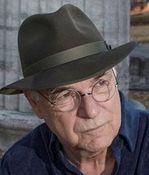 David Olney was a famous singer-songwriter who released more than 20 albums and wrote songs for Emmylou Harris, Steve Earle, Linda Ronstadt, Steve Young, Del McCoury, Laurie Lewis and many others. On January 19, 2020, this 71-year-old was performing his second show of the day at the Songwriter Festival in Santa Rosa Beach, Florida, and was in the middle of his third song when he suddenly stopped singing and playing his guitar. He said, “I’m sorry” to the audience, shut his eyes, put his chin on his chest, remained on his stool with his hat still on his head and did not drop his guitar. When he stayed motionless for more than 30 seconds, fellow band members put him on the ground, tried to revive him, and called 911. He was pronounced dead at the hospital, most likely from a heart attack.
David Olney was a famous singer-songwriter who released more than 20 albums and wrote songs for Emmylou Harris, Steve Earle, Linda Ronstadt, Steve Young, Del McCoury, Laurie Lewis and many others. On January 19, 2020, this 71-year-old was performing his second show of the day at the Songwriter Festival in Santa Rosa Beach, Florida, and was in the middle of his third song when he suddenly stopped singing and playing his guitar. He said, “I’m sorry” to the audience, shut his eyes, put his chin on his chest, remained on his stool with his hat still on his head and did not drop his guitar. When he stayed motionless for more than 30 seconds, fellow band members put him on the ground, tried to revive him, and called 911. He was pronounced dead at the hospital, most likely from a heart attack.
His Life and Career
Olney was born in Providence, Rhode Island in 1948 and went for a short time to the University of North Carolina at Chapel Hill, where he said he spent more time playing folk music in bars than studying. At age 23, he joined Bland Simpson’s band in New York, and the next year he moved to Atlanta. At age 25, he moved to Nashville and formed a band, “The X-Rays,” that recorded two albums, appeared on Austin City Limits, opened for Elvis Costello, and broke up in 1985. At age 38, Olney started a solo career and produced more than 20 albums. He wrote songs about the donkey who carried Jesus into Jerusalem, the iceberg that sank the Titanic, a Nashville train disaster, baseball shortstop Phil Rizzuto, and actor John Barrymore. In his 60s, he had surgery following a heart attack. At the time of his death at age 71, he had an estimated net worth of 60 million dollars.
What Causes a Heart Attack?
Heart attacks are caused by a sudden complete obstruction of an artery leading to the heart, which completely deprives a part of the heart muscle of oxygen. First a plaque breaks off from the inner lining of an artery leading to the heart, the area bleeds and a clot forms. Then the clot extends to block completely all blood flow to a part of the heart muscle and the heart muscle dies from lack of oxygen. When heart muscle is deprived completely of blood-borne oxygen for longer than 30 minutes, it starts to die. After 6 to 8 hours, the oxygen-starved part of the heart muscle is dead and will be replaced by scar tissue that cannot contract to circulate blood through the body.
When blood flow to the heart is blocked, the heart can start to beat irregularly or stop beating completely. If the heart is damaged enough to beat irregularly or stop pumping blood to the brain, the brain can die in just six minutes. Since the brain controls breathing, the death of brain cells can stop you from breathing and the brain then becomes irreversibly damaged.
Everybody Should Learn CPR (Cardio Pulmonary Resuscitation)
CPR can save a life if performed as soon as possible after a person’s heart stops beating. Ninety percent of people who suffer from sudden heart stoppage die before they reach the hospital, and if a person receives CPR within minutes of passing out, his chance of survival triples (Circulation, 2018;137(12): e67-e492). If you see a person who is unconscious and does not respond to you when you shout at or shake him, or the person is not breathing or is gasping for breath, call 911 immediately. Ask if there is an external defibrillator in the area. If you know how to do CPR, start it immediately.
• Place the person on his back
• Put both hands together, one on top of the other with the heels of your hands on the center of the chest,
•With both hands, push down hard and fast at a rate of 100 to 120 pushes a minute.
• Let the chest come up completely after each push
• You will be exhausted after just a minute or two, so call for help and line up as many people as possible to take turns of a minute each pumping on his chest
• Most people should not bother with mouth-to-mouth breathing as it interferes with smooth pumping on the chest which circulates blood to the brain.
• Continue until medical professionals arrive, or until a person with formal CPR training can take over, or a defibrillator arrives.
Everyone should consider taking a class in CPR.
David Charles Olney
March 23, 1948 – January 18, 2020

